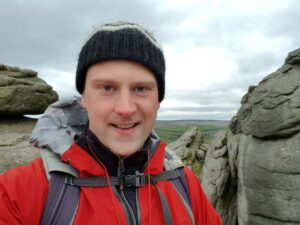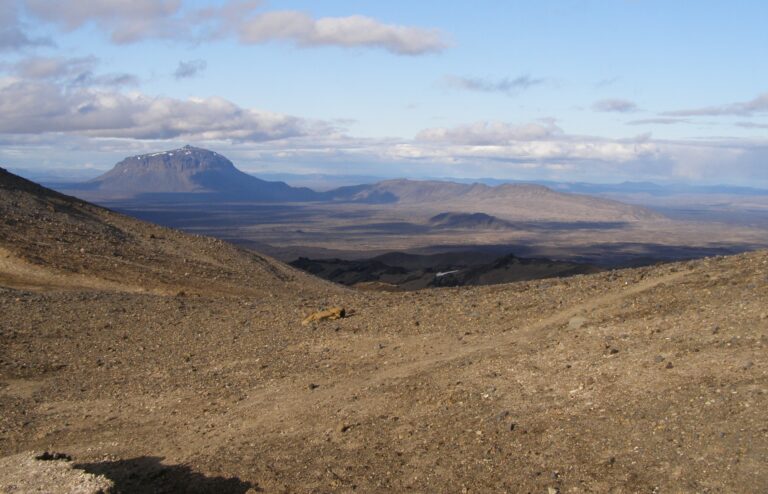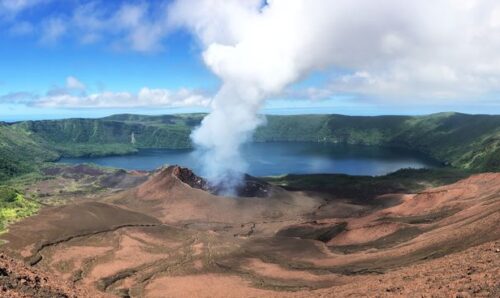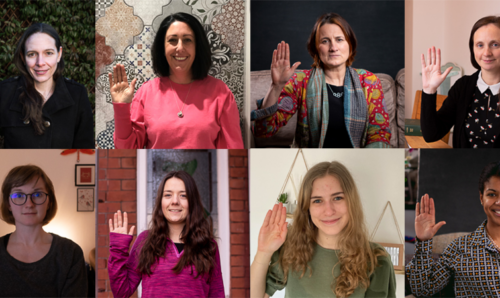In conversation with Dr David Neave – Presidential Fellow
Meet the Department 29 July 2019
I spoke with Presidential Fellow Dr David Neave last week about his work – from magma plumbing systems, to measuring the depth of magma chambers and recreating magma in the lab. He talked about his background and why Manchester is the perfect place to continue his research.

Can you describe your research for the layman?
I’m interested in using volcanic rocks and experiments at high pressures and high temperatures to understand how magma plumbing systems – the pipes that feed volcanoes – behave. This can help us to understand how and why volcanic eruptions happen, and to investigate the deeper structure of the Earth. In fact, you can almost think of volcanoes like windows into the inside of our planet.
How did you first get interested in your research area?
I always had an interest in fossils from childhood, so you might have thought I’d have become a palaeontologist. In fact, I actually applied to university to study biology, but took geology as an optional course and enjoyed it more! I had very inspirational geology lecturers and as time went on, I found that I was particularly interested in petrology, volcanology and geochemistry. I did a Masters project on an Italian volcano called Pantelleria and enjoyed it a lot – that really set me off in the direction I’m still heading in now.
Jemma: Where did you study?
I studied in Cambridge. I also did my PhD there, looking at Icelandic volcanoes. I then moved to Hannover in Germany for a couple of postdocs, to learn new experimental skills to study rocks at high pressures and high temperatures, to recreate magma in the lab. I then applied for my current position in Manchester, and I’m currently trying to set up a similar lab here. Overall, I try to mix looking at natural rocks, where the Earth has already done the experiment for you, with looking at experimental samples where you try to recreate nature in a lab.
How will working in Manchester benefit your research?
There’s a huge breadth of expertise here in Manchester, so there are lots of people who can give feedback on my work and chat about new ideas with. Also, I think the history of the University, the fact that it includes what used to be UMIST with its strong technical background, means people are a lot more excited about building labs, designing equipment and developing new techniques than they are in some other universities. In fact, there are probably very few places where you could try and set up an experimental petrology lab in the UK and Manchester is certainly one of them, which is a real bonus for me.
Describe your role in the School.
I’m employed on a Presidential Fellowship, which is a 4-year research fellowship funded by the university to attract people who are going to devote a lot of energy to their research. This fellowship is giving me the time and space to think up interesting questions and then find the funding needed to answer them. I’m excited to be involved in other aspects of university life too – I really enjoyed helping on an undergraduate fieldtrip in Devon this year and I’m going on a similar trip to Scotland next year – but my main focus at the moment is building up an exciting research programme.

What are you proudest of in your career to date?
We still don’t know very much about where magma is stored beneath volcanoes before they erupt, so I think one of the most important things I’ve worked on so far has been improving ways of estimating the depths at which magma chambers are.
Jemma: How can you find that out?!
The chemistry of some minerals depends on the pressure at which they crystallise. So, if you know the relationship between the composition of one of these minerals and the pressure at which it formed, you can go to a volcano, measure minerals erupted from it and then estimate the depth of the magma chamber from which they came. This can be really important for interpreting the behaviour of active volcanoes and understanding the risks they present.
What are your hobbies or interests outside of work?
I have quite diverse interests. After moving to Germany, I became very interested in German history, and that in turn made me realise I knew basically nothing about British history! So, reading up on British history is a current project – I didn’t even do GCSE at school. I also do quite a lot of cooking. I find it quite relaxing to invest time in new culinary adventures! Nigel Slater is a personal hero. I’ve also got a young daughter who’s nearly two, so it’s a busy time at home. She’s really good fun but I wish I could tap into her seemingly limitless energy reserves sometimes!
Interview conducted by Jemma Stewart.
Academic InterviewExperimental techniquesMagma ChambersMagma in the labMagma plumbing systemsVolcanology



Leave a Reply